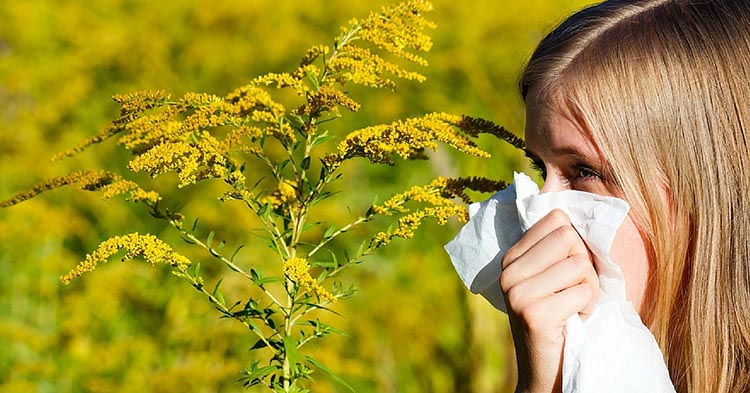
Few plants are despised as much as the ambrosia psilostachya, better known in North America as ragweed. This type of plant grows all around the United States, although it’s most commonly found in the Midwest and eastern states. Ragweed usually causes allergic reactions during the late summer and early fall, when the plant releases its pollen in an attempt to reproduce.
Unavoidable Pollen
Ragweed pollen is nearly impossible to avoid. A single plant emits as many as 1 billion grains of pollen per season. Incredibly, pollen has been found floating in the air up to 400 miles offshore and two miles above sea level in the atmosphere. Part of the reason that ragweed is so prolific is the fact that it has evolved to grow in areas where other plants typically will not.
The majority of the pollen tends to be released between the hours of 10:00 a.m. and 3:00 p.m. If the mercury dips below 50 degrees Fahrenheit, or if rain has recently fallen in the area, the amount of pollen emitted by ragweed is reduced.
Ragweed Allergies
The human immune system is designed to respond to threats such as viruses and bacteria by eliminating them from the body through an immune response. However, the immune system sometimes responds to items that aren’t threats — such as ragweed pollen — by attempting to flush it out of the system. As a result, eyes become puffy, noses run, sneezing fits break out, and the throat and nose become itchy. When the allergic response is severe, symptoms such as chronic sinusitis, asthma attacks, headaches, and sleep impairment occur.
Diagnosing Ragweed Allergies
If you suffer from these symptoms, getting tested for ragweed allergy rules out other diagnoses that are potentially more serious. A quick test that scratches ragweed pollen on the skin is one way of determining an allergy, with a positive result confirmed through irritation of the skin. If necessary, a blood test to check for a specific ragweed antibody may be performed, although this test takes longer to confirm and is more expensive to undertake.
What Can I Do about Ragweed Allergies?
There is no permanent cure for ragweed allergies, and the best way to deal with ragweed pollen is to avoid it as much as possible. Wash your hands frequently and shower before bed to help reduce the amount of pollen on your skin. Keep track of pollen levels in your area and stay indoors when the count is high. Use HEPA filters in vacuums and air conditioners within your home. Take medications such as antihistamines or an allergy shot to reduce the body’s response to ragweed.
Think You Might Have an Allergy?
While there are plenty of ways to temporarily relieve the effects of allergies, the symptoms will typically return. At Houston Sinus & Allergy, we help patients to meet their allergies head on with more permanent solutions, such as immunology.
Learn more about our allergy treatments, including our allergy testing, and start breathing properly again!

